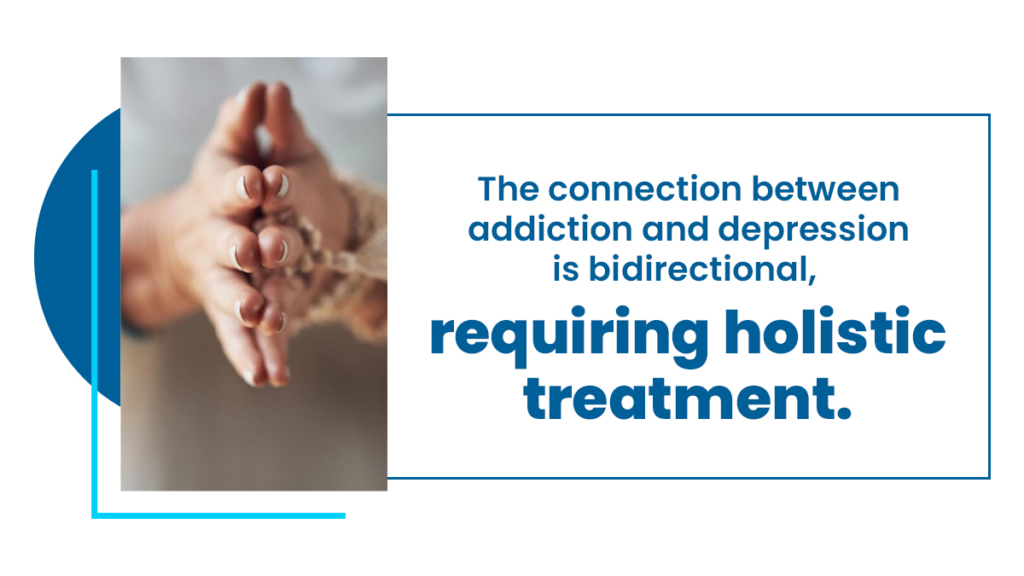Addiction and depression are complex and often intertwined psychological conditions that impact individuals’ well-being and quality of life. Addiction, whether to substances or behaviors, can lead to a vicious cycle of self-destructive patterns, contributing to feelings of despair and hopelessness.
Depression is a mood disorder characterized by persistent sadness, magnifying the vulnerability to addictive behaviors as individuals seek relief from emotional pain.

This intricate relationship between addiction and depression underscores the importance of holistic approaches to mental health, emphasizing comprehensive treatment strategies that address both conditions, ultimately promoting healing and recovery.
Key Takeaways
The intertwining of addiction and depression has long captured the attention of researchers and clinicians alike. Here’s what we know:
- Addiction and depression often coexist, creating a complex interplay between mental health and substance abuse.
- The connection between addiction and depression is bidirectional, requiring holistic treatment.
- Combating depression and addiction necessitates support, therapy, self-care, and addressing triggers.
Contact The Haven Detox Little Rock at (501) 271-3342 for personalized treatment services to step toward sober living.
Underlying Causes of Addiction and Depression
Depression and addiction are complex and multifaceted conditions, each with its underlying causes. While these causes can vary from person to person, several common risk factors contribute to the development of depression and addiction:
Biological Factors
- Genetics: A family history of depression or addiction can increase an individual’s susceptibility to these conditions.
- Neurochemical Imbalance: Disruptions in brain chemicals (neurotransmitters) like serotonin, dopamine, and norepinephrine play a role in depression and addiction.
Psychological Factors
- Trauma and Stress: Childhood trauma, abuse, neglect, or significant life stressors can increase the risk of both conditions.
- Low Self-Esteem: Negative self-perception and feelings of worthlessness can contribute to depression and the desire to escape through addictive behaviors.
Environmental Factors
- Social Isolation: Lack of social support or meaningful relationships can contribute to feelings of loneliness and exacerbate depression and addiction.
- Peer Pressure: Social influences and pressure from peers to engage in addictive behaviors can lead to substance abuse or addictive habits.
Cognitive Factors
- Negative Thought Patterns: Persistent negative thinking, distorted beliefs, and rumination can contribute to the development of depression.
- Escapism: Both depression and addiction can serve as a means of escaping from emotional pain or overwhelming thoughts.
Dual Diagnosis (Co-Occurring Disorders)
Depression and addiction often coexist, with one condition influencing or exacerbating the other. Adults with depression may turn to substances for relief, which can lead to addiction.
- Personality Traits: Certain personality traits, such as impulsivity, sensation-seeking, and low frustration tolerance, can contribute to depression and addiction.
- Physical Health: Chronic illnesses, pain, and hormonal imbalances can impact mental health and increase vulnerability to depression and addiction.
Signs of Drug Addiction
- Increasing tolerance and needing larger amounts to achieve the desired effect
- Neglecting responsibilities and interests in favor of drug use
- Withdrawal symptoms when attempting to quit or cut back on drug use
- Loss of control over drug consumption, leading to compulsive use
- Failed attempts to quit or reduce drug intake
- Social withdrawal and isolation from friends and family
- Deteriorating physical appearance and hygiene
- Changes in sleeping patterns and disrupted sleep
- Sudden shifts in mood and behavior
- Engaging in risky or illegal activities to obtain drugs.
Symptoms of Depression
- Persistent feelings of sadness, mood swings, emptiness, or hopelessness
- Loss of interest or pleasure in once-enjoyed activities
- Significant changes in appetite or weight
- Insomnia or excessive sleeping
- Fatigue or loss of energy
- Difficulty concentrating, making decisions, or remembering
- Feelings of worthlessness or excessive guilt
- Restlessness or slowed movements and speech
- Recurrent thoughts of death or suicide
- Physical symptoms include headaches, digestive issues, or body aches without a clear medical cause
The Cycle of Depression and Drug Addiction
The cycle of depression and drug abuse is a complex and intertwined pattern that often occurs when an individual experiences both clinical depression and substance abuse issues simultaneously. This cycle can be self-perpetuating, leading to a downward spiral of worsening mental health and increased substance misuse.
Here’s a general overview of how this cycle can manifest:
- Vulnerability: It often starts with a predisposition to mental health issues, such as genetic factors, early life trauma, or chronic stress. Young adults with a history of depression may be more susceptible to turning to substances to cope with their emotional pain.
- Onset of Depression: The individual experiences symptoms of depression, which may include persistent sadness, lack of interest in activities, changes in appetite and sleep patterns, feelings of hopelessness, and low energy. These symptoms can significantly impact their quality of life.
- Seeking Relief: research claims that to cope with the emotional pain and distress caused by depression, the individual may turn to drugs or alcohol as a form of self-medication. These substances might temporarily relieve their negative emotions and help them feel better, at least temporarily.
- Initial Positive Effects: The substances may produce a sense of euphoria or relief, reinforcing that recreational drugs or alcohol can alleviate their depressive symptoms. This positive reinforcement can make it more likely for the individual to continue using substances to escape their emotional pain.
- Escalation of Substance Use: Over time, the individual’s substance use may escalate as they tolerate the effects of the drugs or alcohol. This means they need larger amounts of the substance to achieve the desired results, which can lead to more frequent and heavier use.
- Negative Consequences: As substance use increases, negative consequences emerge. These include deteriorating physical health, strained relationships, poor work or school performance, legal issues, and financial difficulties. These consequences can exacerbate depression and contribute to a sense of hopelessness.
- Withdrawal and Cravings: With continued substance use, individuals may experience withdrawal symptoms when they try to cut back or quit. These withdrawal symptoms can be physically and emotionally distressing, leading to intense cravings for the substance. This can make it difficult to stop using, even if the individual wants to.
- Worsening Depression: The cycle continues as the individual’s clinical depression worsens due to the negative consequences of alcohol use disorder and the chemical effects of the most common substances themselves. The individual may experience increased guilt, shame, and worthlessness, further perpetuating the depressive cycle.
- Cycle Reinforcement: The worsening depression and continued substance use reinforce each other in a vicious cycle. The individual may feel trapped and believe they can’t escape their pain without the substances, even though they contribute to their deteriorating mental health.
Treating Addiction and Depression
Treating addiction and depression involves a combination of therapeutic approaches, lifestyle changes, and, in some cases, medication. It’s important to note that each individual’s situation is unique, so treatment plans should be tailored to their needs and circumstances.
Here are some common strategies used to treat addiction and depression:
Dual Diagnosis Treatment
When dealing with co-occurring addiction and major depression, a dual-diagnosis treatment program is essential. This approach acknowledges the intricate interplay between these conditions, recognizing that one can exacerbate the other.
By addressing both issues simultaneously, individuals have a higher chance of sustained recovery.
Cognitive Behavioral Therapy
CBT proves highly effective in treating addiction and mental health conditions. It helps patients identify negative thought patterns and behaviors, replacing them with healthier alternatives. This empowers individuals to manage triggers, cravings, and depressive symptoms, fostering long-term coping skills and emotional resilience.
Inpatient Treatment
For severe cases, inpatient treatment offers a comprehensive approach. It provides a structured environment where individuals, men, women, and teens, receive intensive therapy, medical supervision, and 24/7 support from medical professionals.
Inpatient care is particularly beneficial when addiction and depression are intertwined, offering a focused and immersive setting to address both conditions concurrently.
Support Groups
Joining support groups can provide a crucial sense of community for those battling substance use disorder and depression. Sharing experiences with others who understand the challenges can alleviate feelings of isolation and provide valuable insights and emotional support.
In addition, support groups offer a safe space to exchange coping strategies and encouragement, facilitating a sense of belonging and progress.
Rebuilding Your Life After Addiction and Depression
Rebuilding your life after addiction and depression is a challenging but rewarding journey. It requires commitment, self-compassion, and a proactive approach to healing and growth.
Here are some steps and strategies to help you navigate this process:
- Educate Yourself: Learn about addiction and clinical depression, their causes, and effective treatment options. Understanding your challenges can empower you to make informed decisions and take control of your recovery.
- Set Realistic Goals: Start small and set achievable goals for yourself. Focus on daily tasks, self-care routines, and healthy habits. As you experience small successes, your confidence and motivation will grow.
- Avoid Triggers: Identify and avoid situations, places, or people that could trigger cravings or negative emotions. Creating a supportive environment will help you stay focused on your recovery.
- Develop Healthy Habits: Prioritize physical well-being by adopting a balanced diet, exercising regularly, and getting enough sleep. These habits can positively impact your mood, energy, and overall mental health.
- Practice Mindfulness and Meditation: Mindfulness techniques and meditation can help you manage stress, reduce anxiety, and cultivate a greater sense of self-awareness. These practices can be particularly beneficial during moments of temptation or emotional distress.
- Create a Support Network: Surround yourself with supportive and understanding individuals. This could include friends, family members, support groups, or online communities. Connecting with others who have faced similar mental health problems can provide a sense of belonging and encouragement.
- Consider Aftercare: Once you’ve completed initial treatment, continue to engage in aftercare programs, such as support groups or ongoing therapy. These resources can help you maintain your progress and prevent relapse.
Frequently Asked Questions (FAQ)
Is there a connection between addiction and depression?
Yes, a strong link exists between depression and addiction. Individuals with depression may use substances or behaviors like drugs, alcohol, or gambling as a coping mechanism. Conversely, substance abuse or alcohol use disorder can lead to chemical imbalances that contribute to or exacerbate depressive symptoms.
This bidirectional relationship often complicates treatment, requiring a comprehensive approach addressing addiction and underlying mental health issues.
What are the two best coping mechanisms to mitigate depression?
Regular physical activity and mindfulness meditation are two effective coping mechanisms for mitigating depression. Exercise releases endorphins, improving mood, while mindfulness helps manage negative thoughts and fosters emotional balance.
When consistently applied, these strategies can contribute to a healthier mental state and overall well-being.
How do you fight depression and addiction?
Fighting depression and addiction involves seeking professional help from mental health professionals, building a supportive network, adopting healthy habits, engaging in therapy, and practicing self-care.
It’s crucial to address underlying issues, maintain a routine, and find positive outlets for emotions.
Embrace Change with The Haven Detox-Little Rock
If you’re grappling with the chains of drug addiction and its detrimental impact on your mental well-being, relief is within reach.
Our dedicated drug addiction programs guide you through a comprehensive journey to recovery. From our effective detoxification procedures to nurturing residential support, we walk alongside you every step of the way.
Furthermore, our expert therapists will empower you with essential coping mechanisms, enabling you to confront and conquer the root causes of your struggles.
Take the first step towards revitalizing your existence. Call us at (501) 271-3342 to schedule your appointment.



